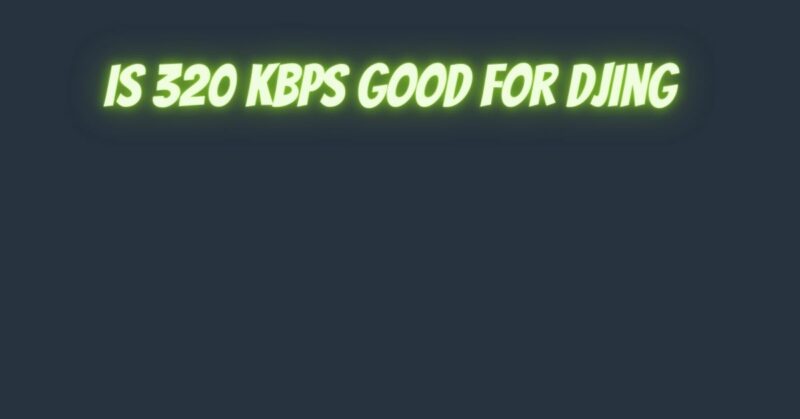In the world of DJing, the pursuit of impeccable audio quality is paramount. As DJs craft sonic landscapes that move crowds and ignite dance floors, the choice of audio format becomes a pivotal decision. Among the many considerations, the bitrate of 320kbps has emerged as a popular choice for DJs. But does this bitrate truly meet the rigorous demands of the DJ booth? In this article, we delve into the nuances of audio quality for DJing and explore whether 320kbps is indeed a suitable choice for the DJ’s craft.
Understanding Bitrate and DJing:
Bitrate represents the amount of data used to encode audio in a specific time frame. In the context of DJing, bitrate influences the sound quality of tracks and how well they translate in a live setting.
320kbps: A DJ’s Ally?
- Audio Quality: Tracks encoded at 320kbps offer a higher level of audio quality compared to lower bitrates. This bitrate captures more audio detail, resulting in clearer and more accurate sound reproduction.
- Benefits for DJing: In a live DJ environment, where sound clarity and precision are essential, 320kbps offers a favorable balance between audio quality and file size.
- Considerations: While 320kbps enhances audio fidelity, the benefits might be more noticeable on high-quality sound systems and in venues that prioritize sound quality.
Advantages for DJ Performances:
- Sound Clarity: The higher bitrate ensures that subtle nuances and instrument textures are accurately reproduced, contributing to a well-defined and immersive sound.
- Dynamic Range: 320kbps retains the dynamic range of tracks, allowing DJs to create dramatic shifts between soft and loud passages for maximum impact on the dance floor.
- Crowd Engagement: With enhanced audio quality, DJs can effectively engage the audience with tracks that sound vibrant and resonate throughout the venue.
Practical Considerations:
While 320kbps offers advantages for DJ performances, some practical aspects should be taken into account:
- Storage Space: Higher bitrate files result in larger file sizes. DJs need to ensure they have ample storage for their music library.
- Performance Equipment: To fully appreciate the benefits of 320kbps, DJs should use high-quality headphones, speakers, and sound systems that can accurately reproduce the audio nuances.
- File Management: Organizing and managing larger files might require a streamlined approach to ensure easy access to tracks during performances.
The Art of Song Selection:
While 320kbps is a preferred choice for DJing, it’s important to remember that audio quality is just one aspect of a successful DJ set. Song selection, timing, mixing skills, and reading the crowd all contribute to the overall performance.
Is 320kbps good for DJing? Yes, it certainly is a favorable choice for DJs who prioritize sound quality and want to deliver exceptional performances. The enhanced audio detail, dynamic range, and overall clarity contribute to a memorable experience for both the DJ and the audience. As technology advances and sound systems evolve, the pursuit of top-tier audio quality aligns perfectly with the artistry of DJs who aim to create unforgettable sonic journeys on dance floors around the world.


